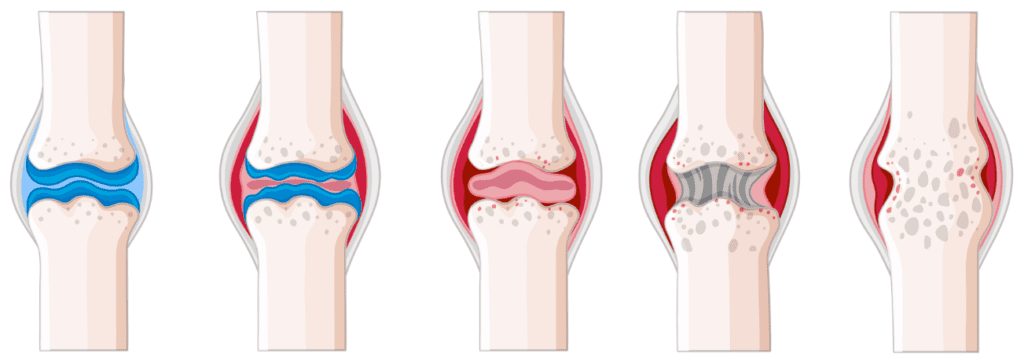
Fatigue in Rheumatoid Arthritis: Effective Strategies
By: Dr. Abe Kopolovich, DPT, MBA, JD-IP

Fatigue has been identified as a significant factor contributing to approximately 36%-44% of limitations in Rheumatoid Arthritis disability. Meanwhile, mental health symptoms are prevalent in 64% of cases, and problems related to physical and social functioning affect around 52%-57% of individuals.
Fatigue in RA Limitations and Symptoms
Rheumatoid Arthritis (RA) brings joint pain, stiffness, swelling, and a range of additional symptoms that significantly impact patients’ quality of life. The Fatigue period is one of the most prevalent symptoms, affecting 40%-80% of individuals with RA.
Recognizing its importance, patients have identified fatigue as a critical outcome in RA, leading to the recommendation by the Outcome Measures in Rheumatology Clinical Trials (OMERACT) group to include fatigue as an outcome domain in all RA studies.
Fatigue stress goes beyond physical exhaustion; it interferes with personal relationships and daily activities. Fatigue has been attributed to 36%-44% of role limitations, 64% of mental health symptoms, and 52%-57% of problems with physical and social functioning in Rheumatoid Arthritis disability patients.

Moreover, it has been found that work disability is one of the most significant consequences of fatigue, as it affects patients’ ability to perform their jobs. Studies have also linked fatigue and Rheumatoid Arthritis to activity impairment.
Fatigue and Disease Perception
In RA early signs, fatigue plays a substantial role in the general perception of health worsening. Regardless of the level of inflammatory control, persistent fatigue leads patients to perceive their disease activity unfavorably.
Furthermore, global patient assessment, strongly influenced by it, affects treatment decisions, increasing medication costs and potential overtreatment risks.
Fatigue in Rheumatoid Arthritis goes beyond disease activity alone. Recent research supports a multifactorial etiology involving various co-morbid factors such as disability, psychological well-being, and social support.
Consequently, accurately assessing fatigue in RA poses multiple challenges.

Understanding the Link Between Fatigue and RA
Along with pain, it is a common symptom experienced by individuals with RA. While fatigue and Rheumatoid Arthritis pain may be related to disease activity, they can persist chronically, even when disease activity is reduced or the person is in remission.
Notably, optimal improvement in fatigue in early RA signs takes approximately six months longer than other outcomes, such as swollen joints. The correlation with RA disability activity remains very low, indicating its multifactorial nature.
Recommended Approaches for Managing Fatigue in RA Patients
Addressing patients’ concerns regarding fatigue is crucial. Good sleep hygiene practices, such as maintaining a consistent bedtime, avoiding exercise before bed, limiting alcohol and caffeine intake later in the day, and creating a calm, quiet sleeping environment, can positively impact sleep quality.
Various online apps offer helpful tools like meditation and deep breathing exercises to enhance sleep. When medication is necessary, low-dose amitriptyline might be beneficial. Pacing and regular exercise can also contribute to managing fatigue.
Strategies to Improve Sleep and Reduce Fatigue Period
If sleep doesn’t occur after about 45 minutes, engaging in a different activity, like reading a book, is advised. It is essential to associate the bed and bedroom solely with sleep, avoiding work-related activities. Acknowledging the problem and recognizing the absence of ideal solutions can help patients cope.
Assigning patients homework to explore and take control of sleep-related options empowers them. Additionally, it is essential to investigate other potential causes of fatigue stress, such as sleep apnea, depression, and anemia, as these may require distinct treatment approaches. Narcotics should be avoided when managing pain, as they can contribute to fatigue and dizziness.
For more information about the effect of Fatigue on Rheumatoid Arthritis, call Therapy-In-Motion (718) 435-7000 or visit us at www.Therapy-In-Motion.com



